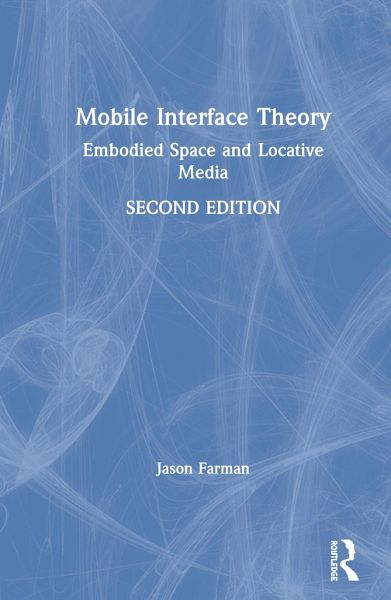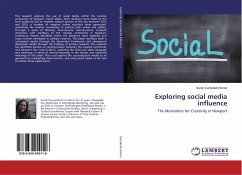Versandkostenfrei!
Versandfertig in 1-2 Wochen
Weitere Ausgaben:

PAYBACK Punkte
84 °P sammeln!





In this updated second edition, Jason Farman offers a ground-breaking look at how location-aware mobile technologies are radically shifting our sense of identity, community, and place-making practices.
Jason Farman is Director of the Design Cultures & Creativity Program at the University of Maryland, College Park. He is Professor in the Department of American Studies and a faculty member with the Human-Computer Interaction Lab. He is also Faculty Associate with Harvard University's Berkman Klein Center for Internet & Society. His books include Delayed Response: The Art of Waiting from the Ancient to the Instant World, Foundations of Mobile Media Studies: Essential Texts on the Formation of a Field, The Mobile Story: Narrative Practices with Locative Technologies, and Mobile Interface Theory: Embodied Space and Locative Media. His work has appeared or been cited in the Atlantic, Atlas Obscura, Real Life, the Chronicle of Higher Education, the BBC, NPR, ABC News, the Associated Press, the Christian Science Monitor, the Baltimore Sun, and the Denver Post, among others.
Produktdetails
- Verlag: Routledge
- 2. Auflage
- Seitenzahl: 204
- Erscheinungstermin: 13. August 2020
- Englisch
- Abmessung: 235mm x 157mm x 16mm
- Gewicht: 454g
- ISBN-13: 9781138625006
- ISBN-10: 1138625000
- Artikelnr.: 60000407
Herstellerkennzeichnung
Libri GmbH
Europaallee 1
36244 Bad Hersfeld
gpsr@libri.de
"Working deftly at the intersection of poststructuralism and phenomenology, Jason Farman develops the concept of the 'sensory-inscribed' body to discuss embodiment through and within mobile interfaces. Enlivened with personal anecdotes, his accessible and theoretically savvy writing provides essential guidance to the effects that mobile media are having on important contemporary issues, from ethical quandaries to geospatial reconfigurations of social relationships." -N. Katherine Hayles, Professor of Literature, Duke University
"This luminously theorized, beautifully written book provides the first comprehensive account of locative mobile media. Jason Farman offers us a distinctive, philosophically attuned perspective on the great
"This luminously theorized, beautifully written book provides the first comprehensive account of locative mobile media. Jason Farman offers us a distinctive, philosophically attuned perspective on the great
Mehr anzeigen
cultural technology of our time-tracing the new relations among bodies, space, and culture." -Professor and Chair, Wee Kim Wee School of Communication and Information, Nanyang Technological University Singapore
"Farman's Mobile Interface Theory is the first [book] that focuses completely on theory for mobile media, and, in doing so, provides an excellent foundation for all of us interested in this area of media scholarship." -Dene Grigar, Washington State University Vancouver, in Leonardo Reviews
"Farman's text represents an ambitiously thoughtful and well-written attempt to understand locative media in terms of embodied experience." -Dan Hassoun, University of Minnesota, in The International Journal of Communication
WINNER OF THE 2012 NANCY BAYM ASSOCIATION OF INTERNET RESEARCHERS BOOK AWARD: "[Mobile Interface Theory] has the potential to inform new scholarship, re-set directions, and remind us that, now, the Internet is not somewhere else, but right here, in our pockets, our minds, our places." -Nancy Baym Annual Book Award (AoIR) Committee
"[Mobile Interface Theory] would work...well as a foundational text in a course on mobile theories...[and] would likely be of interest to those seeking a richer theoretical understanding of how we experience space and time in an increasingly networked world." - Ryan S. Eanes, University of Oregon, USA
"Given the difficulties involved, Farman's attempt to theorize the mobile world is praiseworthy. With the current balance of theoretical studies and empirical research being skewed in favor of the empirical, Mobile Interface Theory makes a valuable contribution to the understanding of the media world." Radhamany Sooryamoorthy, University of KwaZulu-Natal, South Africa, in New Media & Society
"Farman's Mobile Interface Theory is the first [book] that focuses completely on theory for mobile media, and, in doing so, provides an excellent foundation for all of us interested in this area of media scholarship." -Dene Grigar, Washington State University Vancouver, in Leonardo Reviews
"Farman's text represents an ambitiously thoughtful and well-written attempt to understand locative media in terms of embodied experience." -Dan Hassoun, University of Minnesota, in The International Journal of Communication
WINNER OF THE 2012 NANCY BAYM ASSOCIATION OF INTERNET RESEARCHERS BOOK AWARD: "[Mobile Interface Theory] has the potential to inform new scholarship, re-set directions, and remind us that, now, the Internet is not somewhere else, but right here, in our pockets, our minds, our places." -Nancy Baym Annual Book Award (AoIR) Committee
"[Mobile Interface Theory] would work...well as a foundational text in a course on mobile theories...[and] would likely be of interest to those seeking a richer theoretical understanding of how we experience space and time in an increasingly networked world." - Ryan S. Eanes, University of Oregon, USA
"Given the difficulties involved, Farman's attempt to theorize the mobile world is praiseworthy. With the current balance of theoretical studies and empirical research being skewed in favor of the empirical, Mobile Interface Theory makes a valuable contribution to the understanding of the media world." Radhamany Sooryamoorthy, University of KwaZulu-Natal, South Africa, in New Media & Society
Schließen
Für dieses Produkt wurde noch keine Bewertung abgegeben. Wir würden uns sehr freuen, wenn du die erste Bewertung schreibst!
Eine Bewertung schreiben
Eine Bewertung schreiben
Andere Kunden interessierten sich für














